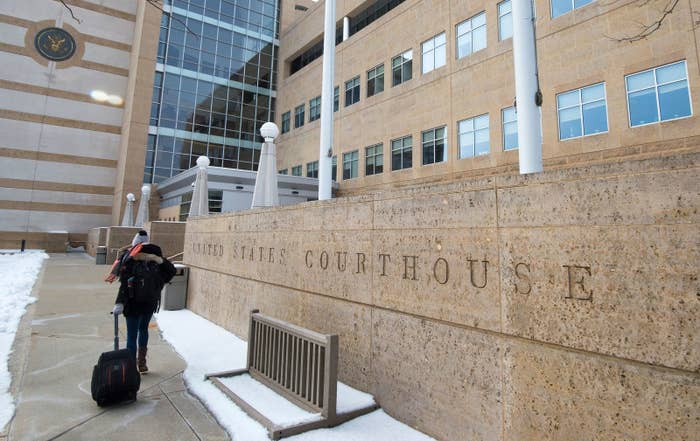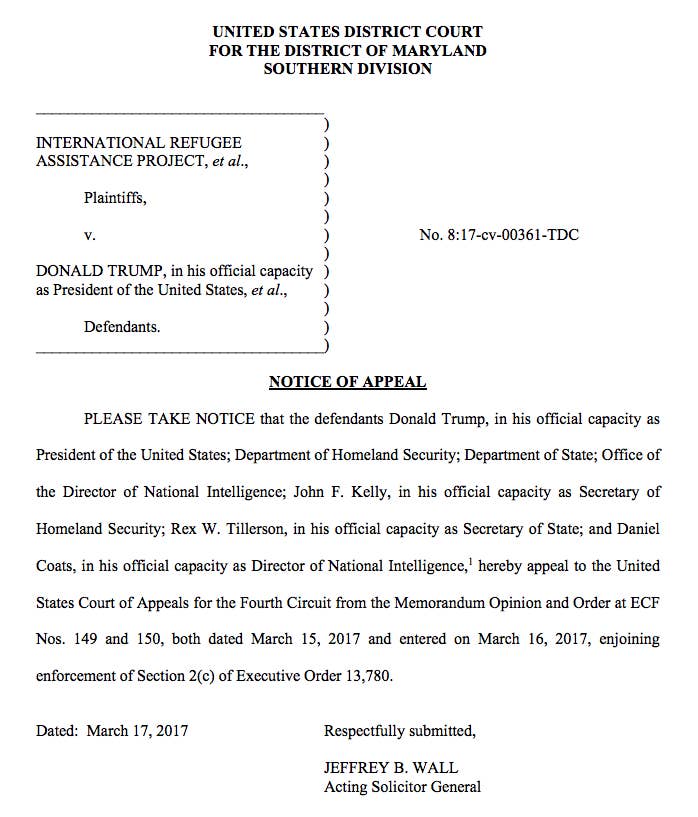
WASHINGTON — The Justice Department on Friday afternoon filed notice that it would be appealing the preliminary injunction halting enforcement of the travel ban in President Trump's second executive order on the topic.
The appeal of the preliminary injunction, issued by US District Judge Theodore Chuang in Maryland, goes to the US Court of Appeals for the Fourth Circuit.
The executive order is aimed at temporarily stopping the refugee program and travel from six majority-Muslim nations and was issued on March 6 after the first attempt faced significant pushback from federal courts.
The injunction by Chuang was the second, and more limited, order issued that halted enforcement of parts of the president's travel ban nationwide.
The first, a temporary restraining order issued by US District Judge Derrick Watson in Hawaii, covers all of sections 2 and 6 of the new executive order — the travel and refugee bans. Chuang's order, on the other hand, only covers section 2(c) — the specific section halting travel from the six countries for 90 days.
Later Friday, meanwhile, US District Judge James Robart — who enjoined the first executive order — put the requests for a TRO in two cases before him on hold for now, given that the relief they seek is already covered by Watson's TRO.
On Thursday, White House press secretary Sean Spicer had said the administration would be appealing Chuang's injunction, so Friday's move had been expected.
The decision to appeal the injunction in Maryland — while, per Spicer, only at this time planning to seek "clarification" on the TRO out of Hawaii — is a result of the types of orders issued by the courts earlier this week — but it also appears to be a strategic move by the administration.
A TRO is a limited order that a judge issues until a decision can be made on the request for a preliminary injunction, which in turn remains in place until a court rules on the merits of a case — generally a request that would include a permanent injunction. TROs can be issued without even including both parties to the lawsuit in a hearing (although that was not the case in Hawaii), and they also are not generally appealable. Preliminary injunctions, on the other hand, can be appealed.
So, in one sense, it makes procedural sense that the Justice Department would appeal Chuang's preliminary injunction but not Watson's TRO.
The fact that Watson's TRO covers all of sections 2 and 6 of the new EO, however, means that winning a stay of — or even an appeal of — Chuang's injunction would not enable the Trump administration to enforce the new executive order.
Additionally, in the challenges to the first executive order, the Justice Department successfully argued that a TRO issued from a judge in Washington there was sufficiently similar to a preliminary injunction that the appeals court considered the appeal. The administration appears, for now at least, not to be moving to take similar action against the Hawaii-based court's TRO.
The reason likely is a strategic move. Appeals from Hawaii would go to the US Court of Appeals for the Ninth Circuit, which issued a strong rebuke of the first executive order and has been the topic of significant criticism from Trump. The appeal out of Maryland, on the other hand, goes to the Fourth Circuit — which also contains a majority of judges nominated by Democratic presidents, but has not yet considered either executive order and therefore could be seen as a better possibility for getting a decision upholding the new executive order.
At that point, the administration still wouldn't be able to enforce the new executive order — but it would change the public dynamics and could set up a legal conflict with the Ninth Circuit as the Hawaii case proceeds to a preliminary injunction and appeal, which then could make it more likely that the Supreme Court would take up and resolve this issue. More importantly, under that scenario, the timeline could be such that a ninth justice — the confirmation hearing for Trump's Supreme Court nominee, Judge Neil Gorsuch, is scheduled for next week — would be on the bench by time the case reaches it.
Of course, if the Fourth Circuit rules against the new executive order on appeal, the Trump administration would be back in the same position it was after the Ninth Circuit's decision this past month: Is it worth it to keep fighting — especially when a decision from the Supreme Court, if it took the case, could limit future action as well?
One of the legal teams opposing the ban — the ACLU — was quick to respond to the news.
"President Trump’s Muslim ban has fared miserably in the courts, and for good reason — it violates fundamental provisions of our Constitution. We look forward to defending this careful and well-reasoned decision in the appeals court," Omar Jadwat, director of the ACLU’s Immigrants’ Rights Project and lawyer to the plaintiffs in the Maryland case, said in a statement.
As of now, the Justice Department's opening brief in the appeal is due April 26. It is likely, however, that further action from the parties — in the form of a request for a stay of Chuang's injunction pending appeal and/or a request for an expedited briefing schedule for the appeal — would be coming before that time.

UPDATE
This was updated to include information about orders from US District Judge James Robart.
